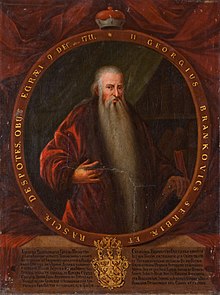Đorđe Branković (count)
|
Đorđe Branković Count of Podgorica |
|
|---|---|

Portrait of Đorđe Branković, made before 1730
|
|
| Born | 1645 Ineu, Arad County, Principality of Transylvania |
| Died | 19 December 1711 Cheb, Bohemia, Habsburg Empire |
| Resting place |
Krušedol Monastery, Serbia 45°07′10″N 19°56′43″E / 45.11944°N 19.94528°E |
| Residence | Gyulafehérvár, Ottoman Porte, Bucharest, Vienna, Cheb |
| Occupation | Dragoman, diplomat, writer |
| Years active | 1663–1711 |
| Known for | claim of descent from the Branković dynasty, attempt to restore the medieval Serbian state, influence on early modern Serbian historiography |
| Notable work | Slavo-Serbian Chronicles |
| Signature | |
 |
|
Đorđe Branković (Serbian Cyrillic: Ђорђе Бранковић, Latin: Georgius Brankovich, Romanian: Gheorghe Brancovici; 1645 – 19 December 1711) was a Transylvanian Serb diplomat, writer, and self-proclaimed descendant of the medieval Serbian Branković dynasty. He served as the agent representing the ruler of Transylvania at the Ottoman Porte. In 1680, he moved to Wallachia, whose ruler sent him as an emissary to the Habsburg Emperor Leopold I in 1688. That year, the emperor conferred the title of Imperial Count on Branković. After Habsburg troops captured parts of Serbia from the Ottoman Empire during the Great Turkish War, Branković attempted to restore the medieval Serbian state with him as its hereditary ruler. His venture failed in its inception, and Habsburg authorities arrested him in 1689. He lived on as a captive in Vienna and Cheb, though he was not held in a prison. He wrote the Slavo-Serbian Chronicles, which was influential in the development of early modern Serbian historiography.
Đorđe Branković was born in 1645 in the town of Ineu (Serbian: Jenopolje) in Arad County, at the western border of the Principality of Transylvania, which was a vassal state of the Ottoman Empire. The Branković family owned large estates, and it had produced several notable soldiers and ecclesiastics since the end of the 16th century, becoming the most prominent among the Serb families of Arad County. Đorđe, who was the youngest of Jovan Branković's four sons, lost his father and two brothers to the plague when he was less than ten years old. His mother then became a nun and retreated into a monastery. Đorđe was taken to raise by his brother Simeon, who became the Orthodox protopope of Ineu. In December 1656, Simeon was consecrated Orthodox Metropolitan of Transylvania; he changed his name to Sava when he took his monastic vows. Metropolitan Sava II moved to the capital of the principality, Gyulafehérvár, taking his brother Đorđe with him.
...
Wikipedia
